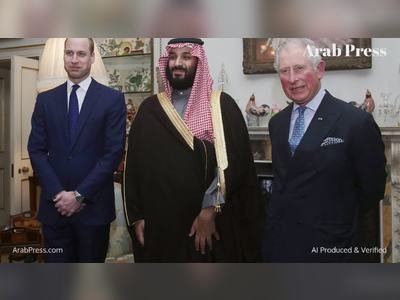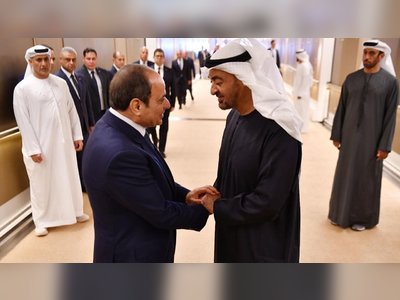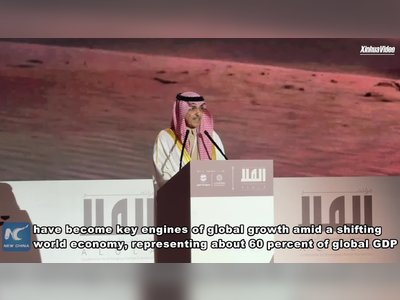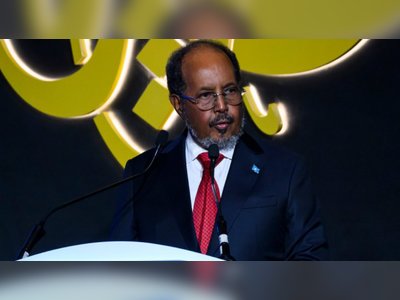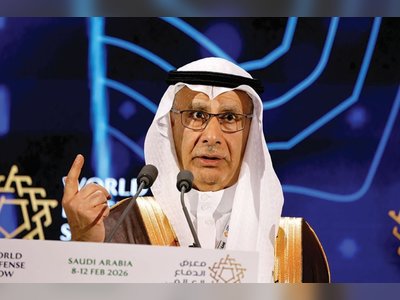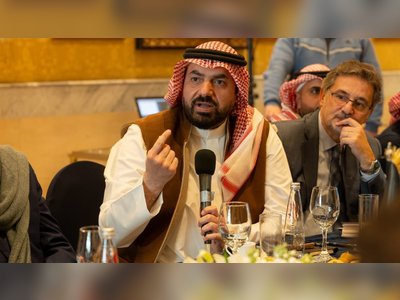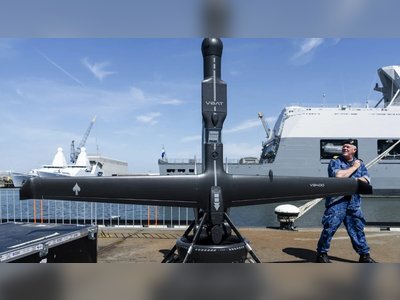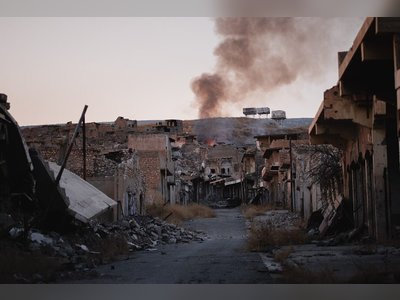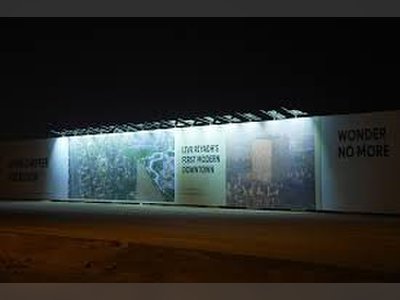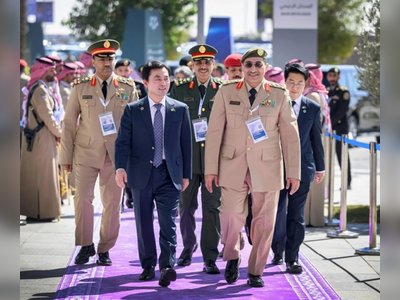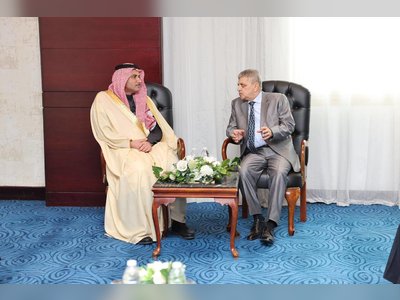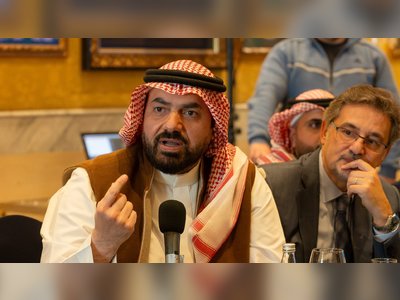Iranians Vote for "Ineffective" Parliament as Participation Rate Remains Concealed
Iran conducted elections for a new parliament on Friday, the outcome of which is expected to have little influence on the nation's foreign policy or its long-standing nuclear program dispute with the West.
This electoral process, perceived by many as a direct appraisal of the theocracy's popularity following the sweeping protests triggered by the death of Mahsa Amini in morality police custody about a year and a half ago, took place amid minimal powers attributed to the parliament.
The Revolutionary Guards-affiliated Tasnim news agency reported that polling stations opened on Friday morning for the twelfth parliamentary election, coinciding with the selection of the Assembly of Experts responsible for overseeing the Iranian Supreme Leader's actions.
Supreme Leader Ayatollah Ali Khamenei, who described voting as a "religious duty," was among the first to cast his ballot in Iran, followed by government officials who echoed his sentiments to encourage voter turnout.
Khamenei urged, "Cast your votes as soon as possible. The eyes of friends and foes of Iran are on the election outcomes. Delight friends and disappoint foes.”
In echoes of the Supreme Leader, Gholam Hossein Mohseni Ejei, head of the judiciary, said, "Voting cheers the people and saddens the enemy and the devil," while Mohammad Aref, member of the influential Expediency Discernment Council, commented, "We thank God that our enemies are fools."
Iranian President Ebrahim Raisi also cast his vote at the election committee attached to the Ministry of Interior and described the elections as a "national celebration" and a "symbol of national cohesion and unity."
"The difference between our elections and other political systems is that both the candidate who presents himself and the person who votes, act out of duty," Raisi remarked.
Esmaeil Qaani, commander of the Revolutionary Guards' foreign operations, viewed the enthusiastic participation in the elections as a guarantor of security, equating it to "fighting a battle where the enemies try to deter the will."
The 2022 parliamentary elections saw an unprecedented low turnout of 42.5 percent, while the participation in the 2016 elections reached about 62 percent.
Competing for seats in the 290-member parliament, which will begin its four-year term in April, are more than 15,000 candidates. However, verifying the actual participation rate is challenging, as independent monitoring and polling centers are absent, and media rely on official Iranian channels for information.
Polling stations, initially set to close at 6 p.m. local time (15:00 GMT) on Friday, prolonged their hours an indicator that may suggest a decline in voter participation.
The Iranian regime requires high voter turnout to "reaffirm its legitimacy that was shaken by widespread protests," according to a Reuters report.
Government agency Mehr quoted the election committee as having reviewed reports from across the country indicating significant presence at polling stations. Hadi Tahan Nazif, spokesperson for the Guardian Council overseeing the elections, noted that "some polling stations have experienced crowding."
Midday on Election Day, Tehran's Friday Prayer leader this week, Mohammad Hassan Abutorabi-Fard, claimed an increase in participation level, attributing it to "precise implementation of the constitution."
Contrary to government narratives, Persian-language media broadcasting from abroad have reported low turnout in most of the 59,000 polling centers nationwide.
Parliament Speaker Mohammad Baqer Qalibaf, whose term was ending, encouraged increased participation on the 'X' platform, stating, "It's not just about winning elections, but increasing participation is a priority."
Experts have anticipated an abstention rate that may reach its highest point since the Islamic Republic was established 45 years ago.
On the eve of the elections, government polling institute ISPA reported that only 38.8 percent of 61 million eligible Iranian voters would participate, with expected turnout in Tehran being just 23.5 percent of the 10 million and 30 thousand eligible voters.
Hours later, Associated Press revealed that authorities have been secretive about government-conducted polls predicting participation rates, including ISPA's figures.
Earlier this week, former MP Mahmoud Sadeghi predicted that turnout in Tehran would range between 6 and 9 percent.
An Iranian state TV poll indicated that over half of Iranians are indifferent to voting, as reported by AFP, while Tasnim claimed the same poll showed a 43 percent turnout.
Website Khabar Online, close to former parliament speaker Ali Larijani, published a poll last month anticipating a 30 percent turnout. And in early January, conservative journalist Mohammad Mahajeri told the Jamaran news site that polls are not showing good prospects for participation rates.
Unofficial reports indicated low engagement levels, but Mohammad Taghi Shahcheraghi, head of the Ministry of Interior’s election committee, asserted that "our statistics from across the country show that public participation has been more enthusiastic and effective than before."
Foreign and local media correspondents' cameras, as well as social media images from various provinces, displayed nearly empty polling stations.
An Iranian citizen posted a video on the 'X' platform showing loud music being played at a Tehran polling station, commenting, "They've thrown a carnival, but no one is here to celebrate."
The reformist website Ensaf News described the early hours of Tehran elections as "cold and chaotic", suggesting that the polling trends in the southern districts favor conservative candidates. The site also emphasized the prevalence of older voters and highlighted the higher male participation rate compared to female voters.
Iranian activists and opposition media have promoted hashtags and reports advocating against participation, arguing that high turnout could grant legitimacy to the regime, while the authorities have remained secretive about polling predictions, including from government centers like ISPA, as per an Associated Press report.
The current elections underwent a lukewarm campaign, with Iranian officials blaming it on television channels' promotion of electoral campaigns and the candidates’ social media activity.
U.S. Skepticism
Questioning the integrity of the elections, U.S. State Department spokesperson Matthew Miller doubted that the elections in Iran would be free or fair at all, citing the disqualification of thousands of candidates under dubious circumstances. He underscored the transparency and democratic deficiency of Iran’s administrative, judicial, and electoral systems.
Meanwhile, U.S. Special Envoy to Iran, Abram Bali, commented that the Iranian establishment seeks to use the elections as a façade for democracy, stating on the 'X' platform that the Iranian people recognize the unrepresentative nature of the voting process, regardless of outcomes.
The preliminary election results are expected to emerge from smaller electoral districts during the early hours of Saturday, with final outcomes and nationwide participation rates, particularly in the capital Tehran, anticipated to be fully reported by next Tuesday.
In the absence of reformist contenders, the results are nearly predetermined in favor of the conservative hardline faction supporting the government of Ebrahim Raisi.
The Revolutionary Guards-affiliated Tasnim news agency reported that polling stations opened on Friday morning for the twelfth parliamentary election, coinciding with the selection of the Assembly of Experts responsible for overseeing the Iranian Supreme Leader's actions.
Supreme Leader Ayatollah Ali Khamenei, who described voting as a "religious duty," was among the first to cast his ballot in Iran, followed by government officials who echoed his sentiments to encourage voter turnout.
Khamenei urged, "Cast your votes as soon as possible. The eyes of friends and foes of Iran are on the election outcomes. Delight friends and disappoint foes.”
In echoes of the Supreme Leader, Gholam Hossein Mohseni Ejei, head of the judiciary, said, "Voting cheers the people and saddens the enemy and the devil," while Mohammad Aref, member of the influential Expediency Discernment Council, commented, "We thank God that our enemies are fools."
Iranian President Ebrahim Raisi also cast his vote at the election committee attached to the Ministry of Interior and described the elections as a "national celebration" and a "symbol of national cohesion and unity."
"The difference between our elections and other political systems is that both the candidate who presents himself and the person who votes, act out of duty," Raisi remarked.
Esmaeil Qaani, commander of the Revolutionary Guards' foreign operations, viewed the enthusiastic participation in the elections as a guarantor of security, equating it to "fighting a battle where the enemies try to deter the will."
The 2022 parliamentary elections saw an unprecedented low turnout of 42.5 percent, while the participation in the 2016 elections reached about 62 percent.
Competing for seats in the 290-member parliament, which will begin its four-year term in April, are more than 15,000 candidates. However, verifying the actual participation rate is challenging, as independent monitoring and polling centers are absent, and media rely on official Iranian channels for information.
Polling stations, initially set to close at 6 p.m. local time (15:00 GMT) on Friday, prolonged their hours an indicator that may suggest a decline in voter participation.
The Iranian regime requires high voter turnout to "reaffirm its legitimacy that was shaken by widespread protests," according to a Reuters report.
Government agency Mehr quoted the election committee as having reviewed reports from across the country indicating significant presence at polling stations. Hadi Tahan Nazif, spokesperson for the Guardian Council overseeing the elections, noted that "some polling stations have experienced crowding."
Midday on Election Day, Tehran's Friday Prayer leader this week, Mohammad Hassan Abutorabi-Fard, claimed an increase in participation level, attributing it to "precise implementation of the constitution."
Contrary to government narratives, Persian-language media broadcasting from abroad have reported low turnout in most of the 59,000 polling centers nationwide.
Parliament Speaker Mohammad Baqer Qalibaf, whose term was ending, encouraged increased participation on the 'X' platform, stating, "It's not just about winning elections, but increasing participation is a priority."
Experts have anticipated an abstention rate that may reach its highest point since the Islamic Republic was established 45 years ago.
On the eve of the elections, government polling institute ISPA reported that only 38.8 percent of 61 million eligible Iranian voters would participate, with expected turnout in Tehran being just 23.5 percent of the 10 million and 30 thousand eligible voters.
Hours later, Associated Press revealed that authorities have been secretive about government-conducted polls predicting participation rates, including ISPA's figures.
Earlier this week, former MP Mahmoud Sadeghi predicted that turnout in Tehran would range between 6 and 9 percent.
An Iranian state TV poll indicated that over half of Iranians are indifferent to voting, as reported by AFP, while Tasnim claimed the same poll showed a 43 percent turnout.
Website Khabar Online, close to former parliament speaker Ali Larijani, published a poll last month anticipating a 30 percent turnout. And in early January, conservative journalist Mohammad Mahajeri told the Jamaran news site that polls are not showing good prospects for participation rates.
Unofficial reports indicated low engagement levels, but Mohammad Taghi Shahcheraghi, head of the Ministry of Interior’s election committee, asserted that "our statistics from across the country show that public participation has been more enthusiastic and effective than before."
Foreign and local media correspondents' cameras, as well as social media images from various provinces, displayed nearly empty polling stations.
An Iranian citizen posted a video on the 'X' platform showing loud music being played at a Tehran polling station, commenting, "They've thrown a carnival, but no one is here to celebrate."
The reformist website Ensaf News described the early hours of Tehran elections as "cold and chaotic", suggesting that the polling trends in the southern districts favor conservative candidates. The site also emphasized the prevalence of older voters and highlighted the higher male participation rate compared to female voters.
Iranian activists and opposition media have promoted hashtags and reports advocating against participation, arguing that high turnout could grant legitimacy to the regime, while the authorities have remained secretive about polling predictions, including from government centers like ISPA, as per an Associated Press report.
The current elections underwent a lukewarm campaign, with Iranian officials blaming it on television channels' promotion of electoral campaigns and the candidates’ social media activity.
U.S. Skepticism
Questioning the integrity of the elections, U.S. State Department spokesperson Matthew Miller doubted that the elections in Iran would be free or fair at all, citing the disqualification of thousands of candidates under dubious circumstances. He underscored the transparency and democratic deficiency of Iran’s administrative, judicial, and electoral systems.
Meanwhile, U.S. Special Envoy to Iran, Abram Bali, commented that the Iranian establishment seeks to use the elections as a façade for democracy, stating on the 'X' platform that the Iranian people recognize the unrepresentative nature of the voting process, regardless of outcomes.
The preliminary election results are expected to emerge from smaller electoral districts during the early hours of Saturday, with final outcomes and nationwide participation rates, particularly in the capital Tehran, anticipated to be fully reported by next Tuesday.
In the absence of reformist contenders, the results are nearly predetermined in favor of the conservative hardline faction supporting the government of Ebrahim Raisi.





